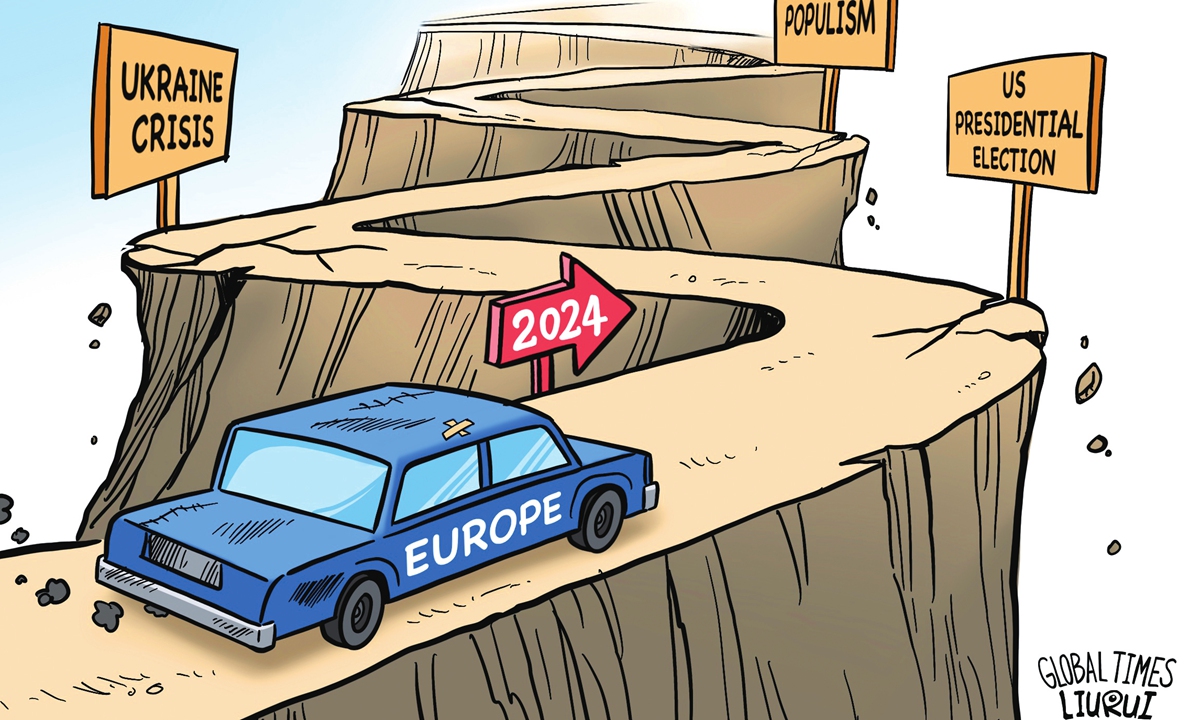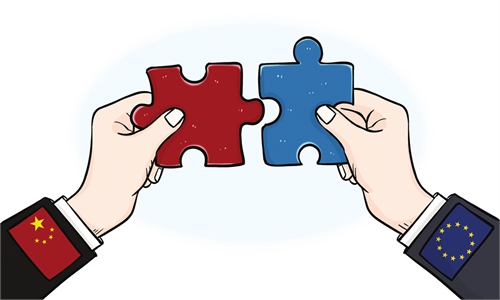
Illustration: Liu Rui/GT
Looking back at 2023, the world was not at peace and Europe also faced challenge after challenge. Entering into the new year, stability is much needed for Europe as it may have even more problems to deal with.In 2024, there are many variables for Europe's stability, with the first being the US presidential election. For now, former president Donald Trump still has a lot of momentum for a comeback, which does not bode well for Europe. Europe knows very well that the US has always been selfish and domineering, but it is really not used to dealing with Trump, a true "rebel" in many ways. It can be said that during his presidency, Trump traumatized Europeans. If he comes to power again, it is still unknown what kind of variables Europe would face, but the transatlantic relationship will certainly see discord - perhaps the biggest risk Europe has to face.
The second variable is the conflict in Ukraine that has been going on for almost two years. It is clear that neither Russia nor Ukraine can gain a decisive advantage over the other, but it is also difficult for them to make any concession. As one of the biggest victims of this conflict, Europe is eagerly looking forward to the end of the conflict, while hoping to eliminate the "Russia threat" as much as possible. Yet, such an idea seems difficult to realize. Moreover, the US government has already backed down on Ukraine aid, and if Trump comes to power, it is foreseeable that Washington's position on this issue will change considerably in comparison with that of the Joe Biden administration. The US can cut down or even halt Ukraine aid, however, the question is, can Europe?
Then there are the elections in the European Union (EU), including in the European Parliament and main EU institutions. According to December polling by Europe Elects, if combined, the far-right Identity and Democracy group and the eurosceptic European Conservatives and Reformists could muster enough support to match the size of the center-right European People's Party, currently, the Parliament's largest group. If this comes true, it will be the first time in the history of the Parliament that the EU's law-making body may not be driven by the center-left and center-right groups. Of course, such a tendency reflects the rising populism in many EU member states, including Italy, Germany, France and the Netherlands. People are worried, not just about the results of the EU elections, but also the greater risk of populism that is likely to lead to the decline in the rationality, stability and continuity of policies in Europe.
The last variable is the issue of the economy. An EU economic forecast in November predicted that the bloc's economy will continue to grow at a low rate in 2024, with the EU and eurozone economies expected to grow at 1.3 percent and 1.2 percent, respectively. Weak consumption and external demand as well as particular uncertainty in the political environment are affecting investor confidence and thus constraining the recovery of the European economy. Even though inflation in major European countries has come down, recently there are already signs showing that inflation may continue to bounce back in France and Germany. The unfavorable economic situation will cause a chain reaction: Without a sound economy, it will be difficult to achieve social stability and avoid political strife.
Against this background, let us take a look at China-Europe relations. Europe's current mentality toward China is undoubtedly ambivalent, as demonstrated by its definition of China as a partner for cooperation, an economic competitor and a systemic rival. The so-called "de-risking" pushed by the EU shows that Europe is unwilling to give up the benefits of cooperation with China, but at the same time is worried about ending up in a disadvantaged position in the competition. Neither China nor Europe wants the other side to become a negative factor and an uncertainty. Therefore, we have seen frequent high-level interactions between China and Europe after the COVID-19 pandemic.
So, will Europe want its relations with China to become another destabilizing factor? Obviously not. After all, what is most needed for Europe in the new year should be more stability, not less. This is something that China and Europe need to work together to achieve, because stability is in the interests of not only both sides, but also the world.
The author is a professor at the School of International Relations of Beijing Foreign Studies University. opinion@globaltimes.com.cn


